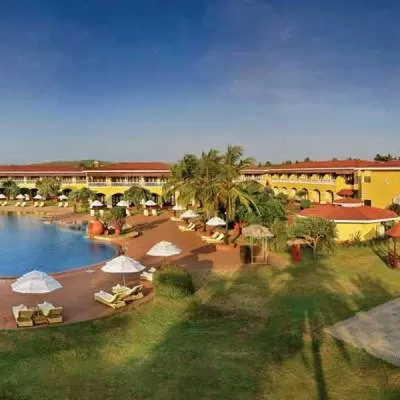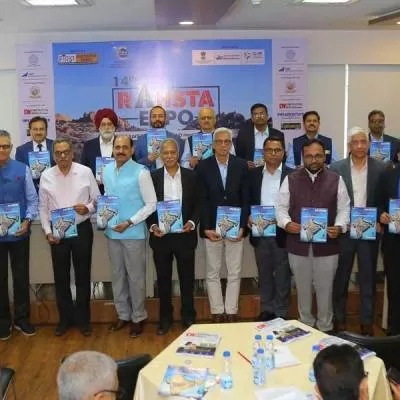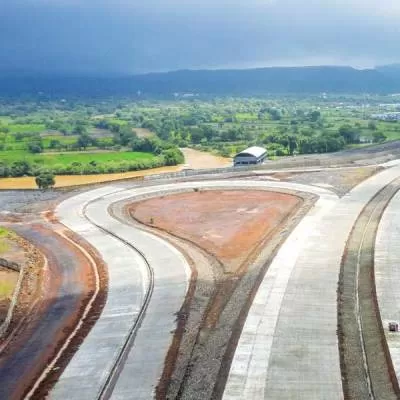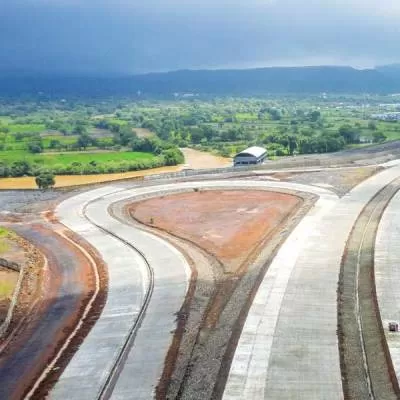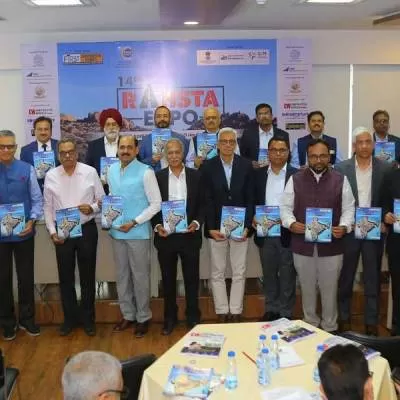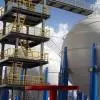- Home
- Infrastructure Transport
- ROADS & HIGHWAYS
- EPC - Excellence, Performance, Commitment!
EPC - Excellence, Performance, Commitment!
Charu Bahri explores the challenges associated with EPC contracts and what it takes for contractors to put their best foot forward.
The need of the hour is capacity enhancement across a host of sectors that form the backbone of the Indian economy. In this scenario, the tempo of growth would speed up with the award of contracts across the board, from infrastructure to the power, oil and gas, chemicals, petrochemicals and fertiliser sectors. And it isn’t surprising that Engineering, Procurement and Construction (EPC) contracts have emerged as the preferred mode to move forward, thanks to the multiple benefits accruing to a client dealing with a single contractor, and the accompanying assurance of having works executed on time and at a fixed price.
The challenges
Contractor speak, however, revolves around the challenges faced in executing EPC contracts. TS Das, Managing Director, Petron Engineering Construction Ltd, cites the tight project schedules associated with the Indian EPC industry; wide fluctuations in Forex currency exchange rates making it difficult to bid with a particular currency; the shortage of mega project managers, construction engineering professionals and skilled workmen; the exposure to region-specific geological and political risks; and delays associated with interfacing with multiple agencies and authorities for approvals as some of the key challenges faced in executing EPC contracts.
In the view of Sunil Mehra, Chairman & Managing Director, Tractebel Engineering Pvt Ltd, “In the typical EPC contract, the engineering, procurement and construction supervision activities are performed by a single contractor. From the consultant's perspective, the efforts by the consultant get reduced in such projects compared to non-EPC projects. However, the focus gets shifted to battery limits, performance guarantee parameters and terms of the client's acceptance. The consultant's challenge is to monitor the project, technically and commercially, on behalf of the client and identify the deviations and risks and accordingly advise the remedial measures to the client. As the client pays more while executing the project in the EPC manner, he expects its consultant to closely watch the progress, quality, technical aspects, envisaged performance, and safety of the project.”
And according to Amitabh Mundhra, Director, Simplex Infrastructures Ltd, “The foremost challenge of an EPC contractor is to apply the right engineering skills to devise a cost-effective solution for clients.”
Project management skills
SM Roy, CEO, Lanco Infratech Ltd - Construction Division, says that EPC contractors who undertake to provide an owner a complete solution take on a wide range of services necessitating project management skills relating to engineering expertise as well as procurement and communication. In this context, he cites the project management skills of leading contractors like MW Kellogg, Fluor Daniel and Bechtel Group Inc as worthy of study and emulation.
To add to that, as it is usually believed that it is too expensive for a contractor to have every expertise in-house, which is why many contractors form consortiums to bid for major projects, engineering skills to design and draw or select the right partner to do so and, subsequently, evaluate the quality of designs and drawings submitted in good time remain the backbone of an EPC contractor irrespective of the sector it is engaged in.
Taxing issues
EPC contractors are known to face taxation issues on account of varying customs, excise and VAT structures in different states. Dipak Ashar, CFO, Gammon India, suggests that EPC contracting companies should monitor contracts to avoid double taxation and take advantage of the provisions of the VAT laws to avoid or reduce the impact of double taxation of TDS on works contract tax.
With regard to the availability of funds, Ashar indicates that well-known, larger players don't face difficulties in raising funds, whether it is overall working capital limits or project-specific limits. However, smaller EPC players, who find it difficult to get fund-based or non-fund based limits, would do well to negotiate project-specific banking limits with their commercial banks. For such players, who are qualified to bid for large value contracts, it would be advisable to tie up project-specific banking limits at the tender stage itself, rather than at a later stage after winning the contract. Lenders prefer to grant project-specific limits rather than general working capital limits.
Contract formats
EPC contracts are techno-commercial agreements necessitating a clear understanding of contract law and contract terms and conditions. As the scope of EPC contracting widens in India, especially as leading Indian contractors acquire overseas experience, contractors are increasingly impelling private and public-sector undertakings to adopt international contract formats such as the ones developed by FIDIC (the International Federation of Consulting Engineers). In this context, Roy observes, “International formats are friendlier to both the contractor and owner, unlike most of the contract formats being executed in India which are traditionally more owner-friendly than contractor-friendly. While Indian contractors are not looking to jeopardise the position of the concessionaire, it is a fact that international formats are easier on contractors vis-à-vis formats usually accepted in India.”
Considering that the execution of an EPC contract is almost always a major challenge, every EPC contract document should ideally include a bonus clause for the early completion of the contracted work. Das also suggests that the EPC contract should specifically cover the possibility of an increase in taxes and duties and, given the long gestation periods of these projects, further provide for unprecedented price escalations.
For instance, Unity Infrastructure Ltd's tunnel in Agartala, a project that was fraught with uncertainty on account of geopolitical factors, included an escalation clause to cover the increase in price of commodities, labour index and wages and taxation levied by the government.
Materials management
Roy describes the position of the contractor as being fraught with risk typically relating to variation in the prices of inputs. Hence, the correct assessment of vendors is also crucial to making profit. In practice, however, it is seen that many EPC contracts describe a list of 'free issue items' that the owner supplies the EPC contractor at the site within specified dates. The contractor not only takes custody of such items, but is also responsible for their proper storage and upkeep as well as for their erection (in position), making power supply connections and carrying out pre-commissioning and functional checks, etc, based on the drawings and catalogues supplied by the client. Yet, contractors often face problems while conducting trial runs of such equipment after installation, either because of some internal defects or problem or because some accessory is missing. In spite of that, the entire responsibility to set things right falls on the EPC contractor.
Considering that the contractor usually has no knowledge of these items that are directly procured (often imported) by the client nor has any way of detecting fault at the time of taking over, a reputed source at Engineers India Ltd shares a way devised by the company to overcome expense and delays related to correcting such problems. The items are taken over on a 'provisional basis' when they are handed over by the owner at site, that is, subject to check out. A protocol of provisional acceptance is generated and duly signed by both parties. The supplier representative is called to the site, at EIL's cost, to thoroughly check the equipment for completeness and operation. The EIL team is associated in this exercise to understand intricacies and nuances. If there are defects or shortages identified by the supplier representative, the owner is asked to cover the cost to make up the deficiency. Depending on the nature and extent of such items, some monetary provision is made in the EPC price upfront to pay the vendor calling charges.
Executing an EPC contract is no mean feat, but it helps no end to move forward with the right skills and techniques and best practices in place, as has been done in the projects we showcase this month. Read on and you'll see what we mean.
Agartala Tunnel
Contractor: Unity Infraprojects Ltd (UIL)
The job: Construction of a single-line BG tunnel No.1 (Km 29,940 to Km 31,875) between stations Sindhukumarpara and Ambassa, on the Kumarghat to Agartala railway line
Client: Northeast Frontier Railways
Cost: Rs 42.44 crore (escalated to Rs.49.36 crore)
Challenges: Vinay Digrajkar, Manager - Corporate Communications, UIL, points out the key challenges….
• Constructing in soft sandy and alluvial soil is hazardous and requires special construction techniques as well as proper safety measures. UIL responded by bringing in a special blade shield, jet grouting and soft soil stabilising techniques to construct a tunnel, 1,756 m in length, 6.30 m in width and 7.88 m in height.
• The civil engineering works were also made tricky by insurgency and the inhospitable environment (diseases like malaria prevail in the area).
• UIL faced significant difficulties in procuring materials from Guwahati; procurement was slow and more expensive than had been projected.
Key best practices:
• Contractor's domain expertise: UIL focused on mobilising qualified and trained manpower to work under its skilled leadership, as only a trained workforce would have been able to complete the work prior to the contracted completion date. Digrajkar opines, “While the concessionaire gave us the estimates, designs and detailed drawings prepared by experienced architects and engineering consultants after surveying the site, every input was reviewed and, where necessary, improvised by UIL’s in-house team.”
• Escalation clause included in the contract: “While the original contract value was Rs 42.44 crore, the price escalated to Rs 49.36 crore owing to escalation in the price of raw material and certain variation orders issued in view of geopolitical factors,” adds Digrajkar.
Metro Tunnel and Stations in Delhi
Contractor: JV formed by ITD and ITD Cementation
The job: Design and construction of a tunnel (by the Shield TBM) and three stations (using the cut and cover method) between Udyog Bhawan and Lajpat Nagar on the Central Secretariat-Badarpur corridor of the Delhi MRTS.
Client: Delhi Metro Rail Corporation
Cost: Rs 892.5 crore
Challenges: In view of the size of the contract and the different competencies required to design the tunnel and stations, the contract was split into two design subcontracts, one focusing on the design of the tunnel (5,419 m long including stations) and the other on the design of the three stations: Khan Market, JLN Stadium and Jangpura. As Sunitta N Sitap, Assistant General Manager (Business Development), ITD Cementation India Ltd, describes, “It necessitated excellent communication and managerial skills to manage the split contracts and complete the work in less than three years.”
Key best practices: Managing interface between multiple teams executing the project: Separate project managers working under one project director were appointed for each of the subcontracts. That way, the JV was able to avail the competencies of two designers, each specialising in the respective field whereas each designer was better focused on the task at hand while the project managers could liaise with the respective designer without interference from the other. The project managers facilitated the interface required for:
• The design and sizing of the launching and retrieval shaft in stations where the tunnel team was to launch or take out the TBM. This activity required the team engaged in building the stations to defer their own work for a while.
• The cut and cover portions, to finalise the width of the walkway as well as the size of the RCC box based on the tunnel alignment and schedule of dimensions.
• Joint discussions on the connection between stations and the tunnel.
• Creation of the temporary foundation for the movement of the gantry crane over the shaft - this was designed by the station team after consulting the tunnel designer about the load to be handled.
West Haryana Highways Project Pvt Ltd
Contractor: Era Infra Engineering Ltd
Client: NHAI for Gwalior Bypass Project Ltd
Location: Haryana
Cost: About Rs 586 crore
The job:
• Construction of a 63-km stretch, including a new four-lane bypass for Bahadurgarh and Rohtak; and six-laning a stretch between Bahadurgarh and Rohtak on BOT basis.
• Project in consortium with KCT from NHAI for executing the Delhi-Bahadurgarh-Rohtak stretch in Haryana.
• Concession period of 25 years.
Udipi Thermal Power Project
Contractor: Lanco Infratech Ltd
Client: Nagarjuna Power Corporation Ltd
Location: Udipi, Karnataka
Size: Rs 4,268 crore (EPC order)
What it involved:
Main plant, water system, fuel oil system, AHP, internal CHP, external CHP, cooling tower, sea water intake, switchyard, transformer yard civil works, boiler and aux, turbine and aux. and generator and aux supply and supervision of respective erection works CHP, AHP, water system, CW system, compressed air system, fire detection and protection system, fuel oil system, AC and ventilation system, 400 kV switchyard, 220 kV switchyard, GTs, STs, aux. transformers, C&I lab equipment, C&I cables, PADO, etc.
Raw Water Intake and Delivery System
Contractor: Simplex Infrastructures Ltd.
Client: Vedanta Alumina Ltd/Sterlite Energy Pvt Ltd
Location: Hirakund Dam, Samabalpur to Vedanta Alumina Ltd smelter plant at Jharsuguda
Cost: Rs 142 crore
The job:
• Design of (30+40) MGD water supply scheme (civil, electrical and mechanical).
• Construction of pump house and intake well.
• Construction of approach road and bridge.
• Supplying and laying of MS pipeline-1,066.88 mm dia (OD)- 87,000 m; final length of pipeline is 69,000 m.
• Construction of substation at intake well site.
• Supply and erection of pumps (5 No. VT), valves, gantry girders, HT & LT transformers and panel board and 17 km × 2 line-transmission Line-33 kva.
- Construction
- Update
- Portal
- Magazine
- India
- April
- 2010
- World
- EPC
- contracts
- contractors
- economy
- Engineering
- Procurement
- infrastructure
- power
- TS Das
- Petron
- Forex
- Sunil Mehra
- Tractebel
- Amitabh Mundhra
- Simplex Infrastructures
- cost-effective
- SM Roy
- Lanco Infratech
- project
- management
- communication
- MW Kellogg
- Fluor Daniel
- Bechtel Group
- designs
- drawings
- taxation
- Dipak Ashar
- Gammon India
- VAT laws
- TDS
- funds
- FIDIC
- Unity Infrastructure
- Agartala
- tunnel
- escalation
- erection
- materials
- Vinay Digrajkar
- Sindhukumarpara
- Ambassa
- Metro
- Delhi
- ITD
- MRTS
- Era Infra
- NHAI
- Haryana
- Udipi
- Thermal
- Karnataka
- Vedanta
Charu Bahri explores the challenges associated with EPC contracts and what it takes for contractors to put their best foot forward. The need of the hour is capacity enhancement across a host of sectors that form the backbone of the Indian economy. In this scenario, the tempo of growth would speed up with the award of contracts across the board, from infrastructure to the power, oil and gas, chemicals, petrochemicals and fertiliser sectors. And it isn’t surprising that Engineering, Procurement and Construction (EPC) contracts have emerged as the preferred mode to move forward, thanks to the multiple benefits accruing to a client dealing with a single contractor, and the accompanying assurance of having works executed on time and at a fixed price. The challenges Contractor speak, however, revolves around the challenges faced in executing EPC contracts. TS Das, Managing Director, Petron Engineering Construction Ltd, cites the tight project schedules associated with the Indian EPC industry; wide fluctuations in Forex currency exchange rates making it difficult to bid with a particular currency; the shortage of mega project managers, construction engineering professionals and skilled workmen; the exposure to region-specific geological and political risks; and delays associated with interfacing with multiple agencies and authorities for approvals as some of the key challenges faced in executing EPC contracts. In the view of Sunil Mehra, Chairman & Managing Director, Tractebel Engineering Pvt Ltd, “In the typical EPC contract, the engineering, procurement and construction supervision activities are performed by a single contractor. From the consultant's perspective, the efforts by the consultant get reduced in such projects compared to non-EPC projects. However, the focus gets shifted to battery limits, performance guarantee parameters and terms of the client's acceptance. The consultant's challenge is to monitor the project, technically and commercially, on behalf of the client and identify the deviations and risks and accordingly advise the remedial measures to the client. As the client pays more while executing the project in the EPC manner, he expects its consultant to closely watch the progress, quality, technical aspects, envisaged performance, and safety of the project.” And according to Amitabh Mundhra, Director, Simplex Infrastructures Ltd, “The foremost challenge of an EPC contractor is to apply the right engineering skills to devise a cost-effective solution for clients.” Project management skills SM Roy, CEO, Lanco Infratech Ltd - Construction Division, says that EPC contractors who undertake to provide an owner a complete solution take on a wide range of services necessitating project management skills relating to engineering expertise as well as procurement and communication. In this context, he cites the project management skills of leading contractors like MW Kellogg, Fluor Daniel and Bechtel Group Inc as worthy of study and emulation. To add to that, as it is usually believed that it is too expensive for a contractor to have every expertise in-house, which is why many contractors form consortiums to bid for major projects, engineering skills to design and draw or select the right partner to do so and, subsequently, evaluate the quality of designs and drawings submitted in good time remain the backbone of an EPC contractor irrespective of the sector it is engaged in. Taxing issues EPC contractors are known to face taxation issues on account of varying customs, excise and VAT structures in different states. Dipak Ashar, CFO, Gammon India, suggests that EPC contracting companies should monitor contracts to avoid double taxation and take advantage of the provisions of the VAT laws to avoid or reduce the impact of double taxation of TDS on works contract tax. With regard to the availability of funds, Ashar indicates that well-known, larger players don't face difficulties in raising funds, whether it is overall working capital limits or project-specific limits. However, smaller EPC players, who find it difficult to get fund-based or non-fund based limits, would do well to negotiate project-specific banking limits with their commercial banks. For such players, who are qualified to bid for large value contracts, it would be advisable to tie up project-specific banking limits at the tender stage itself, rather than at a later stage after winning the contract. Lenders prefer to grant project-specific limits rather than general working capital limits. Contract formats EPC contracts are techno-commercial agreements necessitating a clear understanding of contract law and contract terms and conditions. As the scope of EPC contracting widens in India, especially as leading Indian contractors acquire overseas experience, contractors are increasingly impelling private and public-sector undertakings to adopt international contract formats such as the ones developed by FIDIC (the International Federation of Consulting Engineers). In this context, Roy observes, “International formats are friendlier to both the contractor and owner, unlike most of the contract formats being executed in India which are traditionally more owner-friendly than contractor-friendly. While Indian contractors are not looking to jeopardise the position of the concessionaire, it is a fact that international formats are easier on contractors vis-à-vis formats usually accepted in India.” Considering that the execution of an EPC contract is almost always a major challenge, every EPC contract document should ideally include a bonus clause for the early completion of the contracted work. Das also suggests that the EPC contract should specifically cover the possibility of an increase in taxes and duties and, given the long gestation periods of these projects, further provide for unprecedented price escalations. For instance, Unity Infrastructure Ltd's tunnel in Agartala, a project that was fraught with uncertainty on account of geopolitical factors, included an escalation clause to cover the increase in price of commodities, labour index and wages and taxation levied by the government. Materials management Roy describes the position of the contractor as being fraught with risk typically relating to variation in the prices of inputs. Hence, the correct assessment of vendors is also crucial to making profit. In practice, however, it is seen that many EPC contracts describe a list of 'free issue items' that the owner supplies the EPC contractor at the site within specified dates. The contractor not only takes custody of such items, but is also responsible for their proper storage and upkeep as well as for their erection (in position), making power supply connections and carrying out pre-commissioning and functional checks, etc, based on the drawings and catalogues supplied by the client. Yet, contractors often face problems while conducting trial runs of such equipment after installation, either because of some internal defects or problem or because some accessory is missing. In spite of that, the entire responsibility to set things right falls on the EPC contractor. Considering that the contractor usually has no knowledge of these items that are directly procured (often imported) by the client nor has any way of detecting fault at the time of taking over, a reputed source at Engineers India Ltd shares a way devised by the company to overcome expense and delays related to correcting such problems. The items are taken over on a 'provisional basis' when they are handed over by the owner at site, that is, subject to check out. A protocol of provisional acceptance is generated and duly signed by both parties. The supplier representative is called to the site, at EIL's cost, to thoroughly check the equipment for completeness and operation. The EIL team is associated in this exercise to understand intricacies and nuances. If there are defects or shortages identified by the supplier representative, the owner is asked to cover the cost to make up the deficiency. Depending on the nature and extent of such items, some monetary provision is made in the EPC price upfront to pay the vendor calling charges. Executing an EPC contract is no mean feat, but it helps no end to move forward with the right skills and techniques and best practices in place, as has been done in the projects we showcase this month. Read on and you'll see what we mean. Agartala Tunnel Contractor: Unity Infraprojects Ltd (UIL) The job: Construction of a single-line BG tunnel No.1 (Km 29,940 to Km 31,875) between stations Sindhukumarpara and Ambassa, on the Kumarghat to Agartala railway lineClient: Northeast Frontier RailwaysCost: Rs 42.44 crore (escalated to Rs.49.36 crore) Challenges: Vinay Digrajkar, Manager - Corporate Communications, UIL, points out the key challenges….• Constructing in soft sandy and alluvial soil is hazardous and requires special construction techniques as well as proper safety measures. UIL responded by bringing in a special blade shield, jet grouting and soft soil stabilising techniques to construct a tunnel, 1,756 m in length, 6.30 m in width and 7.88 m in height.• The civil engineering works were also made tricky by insurgency and the inhospitable environment (diseases like malaria prevail in the area).• UIL faced significant difficulties in procuring materials from Guwahati; procurement was slow and more expensive than had been projected. Key best practices:• Contractor's domain expertise: UIL focused on mobilising qualified and trained manpower to work under its skilled leadership, as only a trained workforce would have been able to complete the work prior to the contracted completion date. Digrajkar opines, “While the concessionaire gave us the estimates, designs and detailed drawings prepared by experienced architects and engineering consultants after surveying the site, every input was reviewed and, where necessary, improvised by UIL’s in-house team.”• Escalation clause included in the contract: “While the original contract value was Rs 42.44 crore, the price escalated to Rs 49.36 crore owing to escalation in the price of raw material and certain variation orders issued in view of geopolitical factors,” adds Digrajkar. Metro Tunnel and Stations in Delhi Contractor: JV formed by ITD and ITD Cementation The job: Design and construction of a tunnel (by the Shield TBM) and three stations (using the cut and cover method) between Udyog Bhawan and Lajpat Nagar on the Central Secretariat-Badarpur corridor of the Delhi MRTS.Client: Delhi Metro Rail CorporationCost: Rs 892.5 crore Challenges: In view of the size of the contract and the different competencies required to design the tunnel and stations, the contract was split into two design subcontracts, one focusing on the design of the tunnel (5,419 m long including stations) and the other on the design of the three stations: Khan Market, JLN Stadium and Jangpura. As Sunitta N Sitap, Assistant General Manager (Business Development), ITD Cementation India Ltd, describes, “It necessitated excellent communication and managerial skills to manage the split contracts and complete the work in less than three years.” Key best practices: Managing interface between multiple teams executing the project: Separate project managers working under one project director were appointed for each of the subcontracts. That way, the JV was able to avail the competencies of two designers, each specialising in the respective field whereas each designer was better focused on the task at hand while the project managers could liaise with the respective designer without interference from the other. The project managers facilitated the interface required for: • The design and sizing of the launching and retrieval shaft in stations where the tunnel team was to launch or take out the TBM. This activity required the team engaged in building the stations to defer their own work for a while.• The cut and cover portions, to finalise the width of the walkway as well as the size of the RCC box based on the tunnel alignment and schedule of dimensions.• Joint discussions on the connection between stations and the tunnel.• Creation of the temporary foundation for the movement of the gantry crane over the shaft - this was designed by the station team after consulting the tunnel designer about the load to be handled. West Haryana Highways Project Pvt Ltd Contractor: Era Infra Engineering Ltd Client: NHAI for Gwalior Bypass Project LtdLocation: HaryanaCost: About Rs 586 crore The job:• Construction of a 63-km stretch, including a new four-lane bypass for Bahadurgarh and Rohtak; and six-laning a stretch between Bahadurgarh and Rohtak on BOT basis.• Project in consortium with KCT from NHAI for executing the Delhi-Bahadurgarh-Rohtak stretch in Haryana.• Concession period of 25 years. Udipi Thermal Power Project Contractor: Lanco Infratech Ltd Client: Nagarjuna Power Corporation LtdLocation: Udipi, KarnatakaSize: Rs 4,268 crore (EPC order) What it involved:Main plant, water system, fuel oil system, AHP, internal CHP, external CHP, cooling tower, sea water intake, switchyard, transformer yard civil works, boiler and aux, turbine and aux. and generator and aux supply and supervision of respective erection works CHP, AHP, water system, CW system, compressed air system, fire detection and protection system, fuel oil system, AC and ventilation system, 400 kV switchyard, 220 kV switchyard, GTs, STs, aux. transformers, C&I lab equipment, C&I cables, PADO, etc. Raw Water Intake and Delivery System Contractor: Simplex Infrastructures Ltd. Client: Vedanta Alumina Ltd/Sterlite Energy Pvt LtdLocation: Hirakund Dam, Samabalpur to Vedanta Alumina Ltd smelter plant at JharsugudaCost: Rs 142 crore The job:• Design of (30+40) MGD water supply scheme (civil, electrical and mechanical).• Construction of pump house and intake well.• Construction of approach road and bridge.• Supplying and laying of MS pipeline-1,066.88 mm dia (OD)- 87,000 m; final length of pipeline is 69,000 m.• Construction of substation at intake well site.• Supply and erection of pumps (5 No. VT), valves, gantry girders, HT & LT transformers and panel board and 17 km × 2 line-transmission Line-33 kva.


